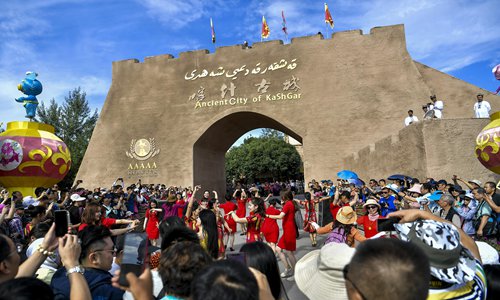HOME >> BUSINESS
Xinjiang benefits from stability
By Wang Cong in Urumqi Source:Global Times Published: 2019/6/19 20:18:40
Region strives to cash in on more opportunities

The opening ceremony of the ancient city of Kashgar in Northwest China's Xinjiang Uyghur Autonomous Region on Saturday attracts throngs of tourists. In June, as fruits mature, Xinjiang ushers in the peak tourist season. Photo: VCG
As massive anti-terrorism and anti-extremism efforts have yielded major progress and led to social stability, Northwest China's Xinjiang Uyghur Autonomous Region, which has been lagging behind in economic growth, is shifting focus to boosting growth.
Seeing abundant opportunities under a series of policy support from the central government and under the Belt and Road Initiative (BRI), cities are moving swiftly to promote businesses in a wide range of areas from tourism to agriculture to foreign trade.
Such a shift was underscored by efforts in Aksu Prefecture, about 1,000 kilometers southwest of the regional capital city of Urumqi, where local officials hosted a large-scale pharmaceutical expo that has attracted hundreds of companies from across the country and abroad. Aksu have been investing heavily in pharmaceutical, textile, tourism, agricultural and other sectors that the prefecture holds great advantage. It has invested 280 million yuan ($40.44 million) in a drug distributing center, which aims to meet demand for drugs and medical equipment in south Xinjiang as well as some Central Asian nations. The center has so far attracted more than 80 companies and the combined sales have reached 1.3 billion yuan, according to official data.
"There has been so much change in the city over the past three to four years," a local driver, who declined to be named, told the Global Times Saturday, pointing to newly built residential buildings and public parks under construction. "In fact, there have been great changes in all over Xinjiang over the last few years."
Xinjiang, which accounts for about one-sixth of China's total land space, have been lagging behind most other provinces in the country in economic growth, largely because of terrorist assaults there years ago. In the first quarter of 2019, Xinjiang's GDP of about 217.77 billion yuan ranked 26th place among China's 31 provinces and regions. However, the prospect for Xinjiang's long-term economic growth has become increasingly bright as counter-terrorism and counter-extremism efforts, including vocational education and training courses aimed to train a small number of people affected by extremist ideologies, yield significant results.
Over the past three years or so, there has not been any violent terrorist incidents in Xinjiang and the security situation here has improved significantly, Geng Shuang, a spokesperson for the Chinese Foreign Ministry, told reporters last week.
With stability, many businesses have come to invest in Xinjiang and tourists have also returned to the region. In the first quarter of 2019, domestic and foreign travelers paid a total of 21.4 million trips to Xinjiang, up 67.31 percent year-on-year, and the region saw a 72.77 percent year-on-year increase in tourism revenue to 24.44 billion yuan, according to official data.
Many companies have also chosen to set up factories and other operations in Xinjiang because of an array of policy and other support from the local governments as well as the great potential for Xinjiang as a key link for the BRI.
"Right now, everything is slow, but we came here because I think there is great future in Xinjiang," Hou Jianfu, owner of Aksu Hengchang Textile Ltd, who moved production from East China's Zhejiang Province to Aksu two years ago, told the Global Times Sunday. "There are so many supportive policies in Xinjiang and the business environment is great."
Xinjiang receives much policy and fiscal support from the central government, as part of the country's western development strategy and efforts to eradicate extreme poverty by 2020. Xinjiang has also received a lot of investment in infrastructure projects under the BRI.
Because of the BRI, foreign trade has become a bright spot for Xinjiang's economy. Latest available data showed that in April, Xinjiang saw a 51.9 percent increase in import to about 2.7 billion yuan and a 15.3 percent increase in export to 8.3 billion yuan.
Posted in: ECONOMY,BIZ FOCUS